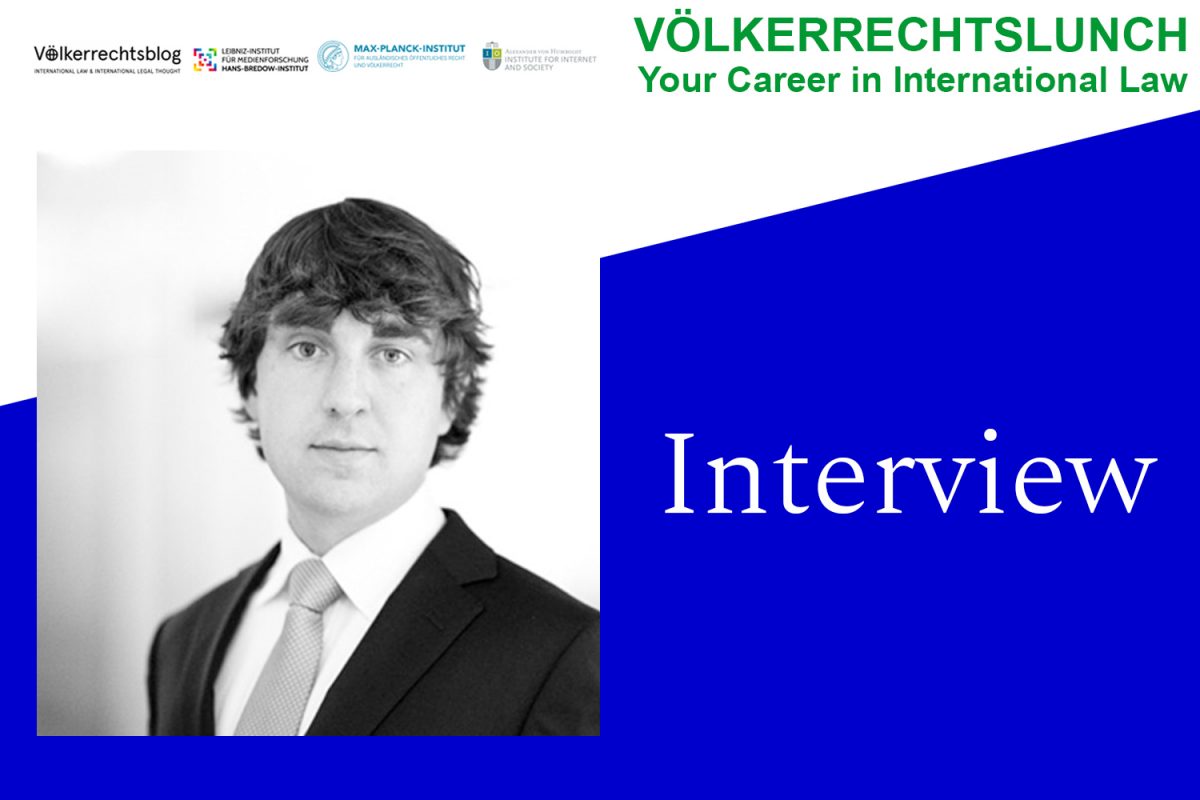Five Questions to Álvaro Nistal
Lawyer for Volterra Fietta
PLEASE NOTE: there has been a change of date. The event will exceptionally take place on Tuesday (4th of May) instead of Monday, 3rd of May.
On the 4th of May 2021 (12 noon to 1 pm), Mr Álvaro Nistal will be the eleventh guest in our “International Law Lunches” discussion series. Álvaro Nistal is qualified to practise law in Spain and as a solicitor of the senior courts of England and Wales. He works in London for Volterra Fietta – a leading law firm in public international law.
In a total of twelve online meetings, we invite international law experts from the field to one-hour talks in which they provide insight into their careers and current activities. Afterwards, students and other interested parties have the opportunity to ask questions about their career and work (the event notice and programme as well as the access data for Zoom can be found here).
Mr Nistal was already available to answer our questions in advance:
Why did you choose a career in public international law?
I have always been interested in law, political science and international relations. When I finished high school, I was not sure which of these subjects to specialize in. I therefore decided to do a double bachelor in law and political science, hoping that, by the end of my graduate studies, I would have a clearer sense of the career path I would like to follow. When I completed those studies, I remained equally interested in law, political science and international relations. Luckily, I soon realized that a career in public international law would allow me to remain in close contact with all three subjects. I therefore decided to specialize in that area of law.
What makes international law special for you?
International law is fascinating for many reasons. One of them is that – correctly developed, interpreted and applied – international law should establish a number of fundamental rules, widely accepted by humanity, that apply equally to all subjects of the international community, helping to reduce the effects of the inequalities existing between weak and powerful subjects. Without international law, the former would have virtually no tool to challenge effectively the actions of the latter, no matter how egregious those actions might be. There also would be no objective metric to assess the appropriateness of State actions in the international sphere.
What is the greatest challenge for international law in the 21st century?
There have always been violations of international law. However, I have the impression that, in recent times, certain national and international actors are increasingly normalizing, justifying and, therefore, misrepresenting the importance of those violations. They have done so in multiple ways, from openly admitting that they have deliberately violated international law to bending the applicable norm to the point that it no longer has any meaningful content. This severely undermines the rule of law in international relations, encouraging other international actors to breach norms they see as an obstacle to their political objectives. As I see it, therefore, the greatest challenge in the 21st century is ensuring that compliance with international law is deemed a virtue and an obligation by both national and international actors, while violations are neither trivialized nor left unanswered.
Which (surprising) skills do you need for your job?
I have realized that common sense and the ability to simplify things are significantly more important than other skills often associated with legal practice. These two skills are often underestimated. They require that, for each task, one regularly goes back to the basics, including by identifying and keeping in mind at every stage of the process the main objective of that task.
What would you like to say to your 20-year-old you?
Take your time, explore as much as possible and, perhaps, even spend some time working in a professional environment before settling on a specific career path. In doing so, make sure that you enjoy greatly the path you choose. Not only you will spend a significant part of your life working but it is also difficult to excel in something that you do not enjoy doing.

Assessor Lukas Kleinert, Master Droit, LL.M. war bis vor kurzem Rechtsreferendar am OLG Hamburg. Er ist seit 2018 Mitglied der Redekation des Völkerrechtsblogs.

Matthias C. Kettemann ist Forschungsprogrammleiter am Leibniz-Institut für Medienforschung | Hans-Bredow-Institut (HBI), Forschungsgruppenleiter am Humboldt-Institut für Internet und Gesellschaft, Berlin und am Sustainable Computing Lab der Wirtschaftsuniversität Wien und Vertretungsprofessur für Völkerrecht an der Friedrich-Schiller-Universität Jena.
